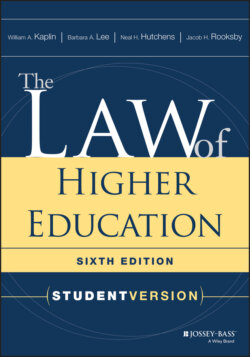Читать книгу The Law of Higher Education - William A. Kaplin - Страница 12
Preface
ОглавлениеOperating the colleges and universities of today presents a multitude of challenges for their leaders and personnel. Often the issues they face involve institutional policy, but with continually increasing frequency they have legal implications as well. For example:
A staff member may decide to become a whistleblower and assert that another college employee is violating the law. If the complaining staff member's performance has been problematic, and “just cause” exists for dismissal, may the college discharge the whistleblowing staff member?
A tenured faculty member may have been accused of sexually harassing a student by requiring the student to complete a project that the student finds offensive. What standards and processes should be used to determine whether the faculty member should be discharged, disciplined, or reprimanded?
A student religious organization may approach the dean of students seeking recognition or an allocation from the fund for student activities. If membership is limited to students of a particular faith, or if the student organization does not admit gays or lesbians, how should the administration respond?
A group of students petitions the administration to develop a “hate speech” code because they believe it will reduce the number of bias incidents on campus. Can a public institution enforce such a provision?
A wealthy alumna may call the vice president for student affairs and offer to make a multi-million dollar donation for scholarships on the condition that they be awarded only to African American students from disadvantaged families. Can and should the vice president accept the donation and follow the potential donor's wishes?
To assist students and instructors who wish to study, research, or teach about issues such as these, and innumerable others, we have prepared this Student Version of our two-volume work, The Law of Higher Education, 6th Edition (“LHE 6th” or “full 6th Edition”). The Student Version provides foundational information, in-depth analysis, and practical suggestions on a wide array of legal issues faced by public and private institutions. The discussions draw upon pertinent court opinions, constitutional provisions, statutes, administrative regulations, and related developments. In order to enhance readability and keep the Student Version of manageable size, we have only occasionally included text or footnote citations to resources for further study and research, such as selected journal articles, books, and websites. We have, however, included a bibliography of such resources at the end of this book. In addition, we have created a convenient crosswalk from the various sections of the Student Version to the corresponding sections of the full 6th Edition, which are chockfull of text citations, footnotes, and annotated bibliographies (at the end of each chapter) that will be highly useful for any student or instructor seeking such resources. The crosswalk appears in the front matter of this book.
